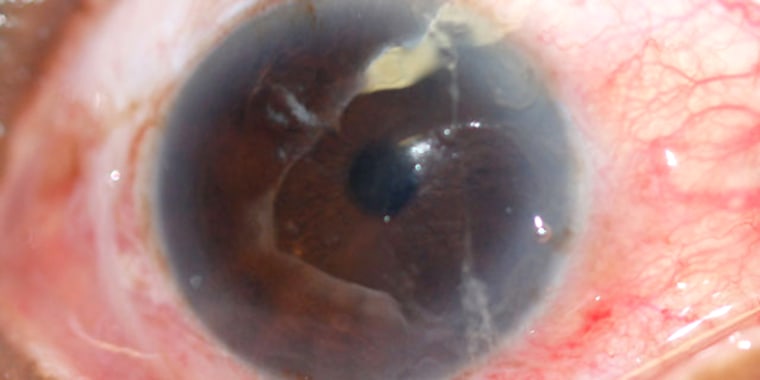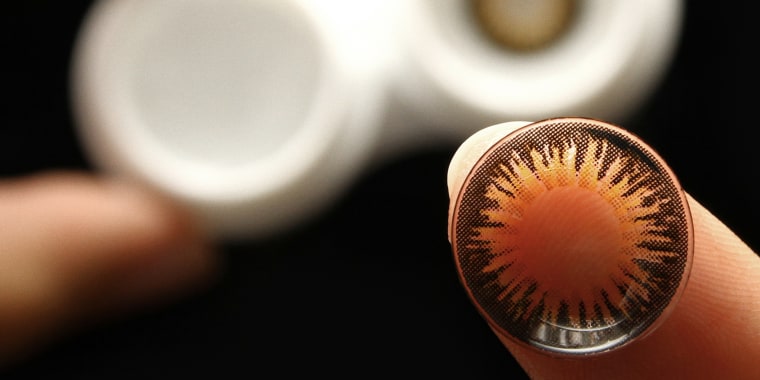When a Halloween outfit just doesn't feel like enough, a lot of people turn to costume contact lenses to complete their scary looks. Want white zombie eyes, lizard contacts, lenses with a blood-splattered effect? Can do. Or, just want an eye color change? No problem.
It’s easy to find special-effect costume lenses just about anywhere: on the internet, in pop-up costume shops and maybe even at the register in some gas stations or convenience stores — any time of year. But, they're not legal to sell and there are important reasons why.
Mamie Gaye, of Cleveland, Ohio, went to her neighborhood beauty supply store on a Wednesday in February 2018 and found a pair of colored contacts to make her brown eyes look like they were a shade of dark blue instead.

“I just saw them and I got them,” Gaye, 20, told TODAY. Her only real worry at the time was how to put the new contacts in the right way. She watched some YouTube instructional videos and, based on what they said, she bought some lens solution and some spare containers. Once she cleaned them, she popped them into her eyes for the first time. That weekend, the then-19-year-old tried the lenses again.
“I went to a party with them on Saturday," Gaye said, and after she got home, she fell asleep with the colored contacts still in her eyes.
When she woke up, she said her vision was blurry. She tried using some drops, but this just seemed to make things worse and she fell back to sleep while still wearing the contacts.
By the next morning, Gaye couldn’t remove the lenses from her eyes. She tried to deal with them for a whole day and finally called an ambulance when she could no longer even open her eyes. She was scared that she was going blind and also worried about the cost of the emergency room trip.
The contacts were “suctioned” onto the surface of her eye and she was in so much pain that the ER doctor had to give her numbing drops. Once they took effect, the doctor removed the lenses using his gloved fingers.
Gaye was told she had scratches on the surface of her eyes, known as corneal abrasions. The fun lenses she casually bought to try out a new color were too tight for her eyes.

“All contact lenses are medical devices and the lens has to fit the patient,” Dr. Thomas L. Steinemann, a professor of ophthalmology at MetroHealth Medical Center in Cleveland, who treated her, told TODAY. “Even though you may not wear a correction, the lens still has to fit the outer surface of your eye, the cornea.”
There are other reasons these over-the-counter contacts are actually very risky.
“You’re going to buy a product that is not approved by the FDA and is quite possibly a tainted product,” Steinemann, who is also a spokesperson for the American Academy of Ophthalmology, said, adding that it’s illegal to sell contact lenses over-the-counter.
One size does not fit all, he said, adding that it’s important to go to a licensed eye-care professional who will do an exam and explain the ins and outs of proper contact lens usage.
According to the U.S. Food and Drug Administration, if the lens doesn’t fit right, it’s not going to be very comfortable and may do real damage, which can include:
- Scratches and other physical damage to the eye
- Extreme redness of the eye
- “Pink-eye” infection
- Irritation on the inside of the eye, known as iritis
- Worst of all, possible blindness after a severe infection
Over-the-counter, non-prescription “fashion” or “costume” lenses are often cheaply made and manufactured in other countries, where they may not be regulated.
“They’ll buy expired lenses and just slap on some paint or dye, which is not a very safe concept, either, because it’s rough,” Steinemann said. “It could scratch the eye and worse yet it could attract germs that cling to the rough surfaces.”
What’s more, the lenses themselves may have germs. Although they may look like the real deal, and they may be inexpensive, these are often counterfeit much like a knockoff designer purse, he added. If they are repackaged lenses, it means the sterile seal is broken.
In a recent study, the FDA found that 48% of these kinds of contact lenses, sold without prescriptions, were contaminated.
Steinemann said Gaye was lucky she didn’t develop an infection. Once the surface of an eye has been scraped, he added, bad things happen more frequently. Infections can easily occur if people inadvertently rub their eyes with dirty fingers, use old or contaminated drops from the medicine cabinet or even just splash their eyes with regular tap water.
Fortunately, Gaye’s vision was not permanently harmed. Still, the recovery process was an ordeal. Light hurt her eyes so much the first week after that she had to keep the room darkened, down to covering the window with a blanket. She could not go outside, even wearing sunglasses, in that week and was taking over the counter medication for the pain.
When she went for a follow-up exam a couple weeks later, she said her vision was still blurry and she remained very sensitive to light.
After all her experiences, she wants other people to stay away from non-prescription lenses that are sold illegally.
“Always go to eye doctors and get them sized for your eyes,” Gaye said. “I’m never getting lenses again unless I go to my doctor and get them prescribed to me.”


